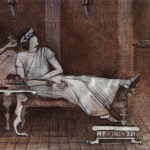What was going on? As a rheumatologist, you are considered among the foremost of medical sleuths. Is there any other specialty as renowned for solving medical mysteries? You probe further. Jack recalls a brief episode of blurred vision that required him to wear glasses for a period of time during his years at boarding school. You also note that, despite the frequently administered courses of antibiotics, Jack suffers from recurrent bouts of urethritis. He is extremely eager and anxious to hear your advice. After all, he has a date with destiny. In about fifteen years, by his 43rd birthday, Jack Kennedy will be elected the President of the United States.
A Time To Remember
This month marks the fiftieth year since that fateful day in Dallas when John Fitzgerald Kennedy was assassinated. Those of us who are old enough to remember the Beatles’ invasion of America can probably recall with frightening detail what they were doing when they heard the news of the president’s death. Seeing old film footage of the venerable newscaster Walter Cronkite shedding a tear as he confirmed JFK’s death to a stunned world still sends shivers down my spine.
To commemorate the president’s passing, I decided to spend some time in the magnificent JFK Presidential Library, which sits proudly atop Columbia Point on the shores of the Massachusetts Bay in the Dorchester section of Boston. There are some marvelous permanent displays highlighting Kennedy’s days as president. Small crowds gather to watch the numerous video clips of the photogenic Kennedy, his elegant wife, Jacqueline, and their two young children, Caroline and John Jr. We can gaze at photos taken on the presidential campaign trail more than 50 years ago. There are thoughtful interactive presentations that allow visitors to probe into the major political matters of that era, including the civil rights movement and the Cuban missile crisis.
The library also holds more than 400 collections of personal papers and institutional records ranging from the White House files of JFK’s closest advisors to the largest collection of papers left by the estate of Ernest Hemingway. Until recently though, the president’s personal medical records were off limits to researchers. In 1983, the Kennedy biographer Herbert Parmet observed that “dealing with the Kennedy medical history is in some ways like trying to uncover aspects of vital national-security operations.”1 Another noted Kennedy biographer, Robert Dallek, unearthed a fascinating historical nugget. Richard Nixon may have tried to gain access to Kennedy’s medical history. In the fall of 1960, as he and JFK battled in what turned out to be one of the closest presidential elections ever, thieves ransacked the office of Dr. Eugene J. Cohen, a New York endocrinologist who had been treating Kennedy for Addison’s disease. When they failed to find Kennedy’s records, which were filed under a code name, they tried unsuccessfully to break into the office of Dr. Janet Travell, an internist who had been relieving Kennedy’s back pain with injections of procaine. Although the thieves remain unidentified, Dallek speculates that they were Nixon operatives.1 Was this a prelude to the Watergate break-ins? Had the burglars succeeded, they would have found a lengthy daily medication list including: hydrocortisone, 10 mg; prednisone, 5 mg; methyltestosterone, 10 mg; liothyronine sodium, 50 micrograms; fludrocortisone, 0.1 mg; ascorbic acid 1000 mg; and sulfa antibiotics, diphenoxylate hydrochloride, and atropine sulfate as needed. There was also the intermittent use of methylphenidate and meprobamate, and intramuscular injections of gamma globulin.


